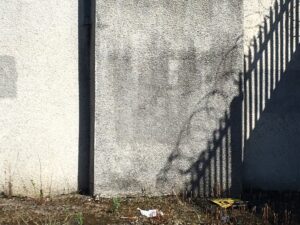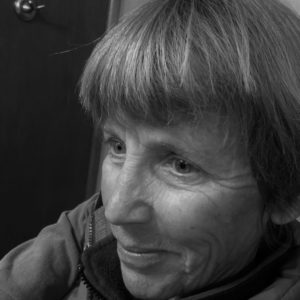My first day in prison went better than I expected. The guards were patient with me, even when I was stuck for several minutes in a sort of no man’s land between two heavy doors, a security zone with cameras set too high to record the presence of a five-foot tall person. It took some jumping and waving on my part to activate the inside door, and by then I was late for class.
I was just out of graduate school, and this was my first real job, teaching creative writing in the prison complex on the outskirts of Tucson. It was a maximum security prison, all male inmates. I was older than some of the men and much younger than many. I had heard of Richard Shelton’s success in teaching writing in the prisons, a program supported by the University of Arizona Poetry Center. By 1982, Pima College was offering associate degrees to inmates and looking for instructors. I knew almost nothing about teaching, and less than nothing about prison life. I wasn’t even tall enough to activate the cameras in the security zone. What the heck was I thinking?
Once I escaped no man’s land and entered the prison yard, a guard walked me to my classroom and left me there at the door. I entered the room. It was windowless and painted green—the wrong kind of green. I heard the door click and realized, of course, I was now locked in with my students. I was the newest prisoner in the room.
I don’t remember if I found this disturbing, but I did have one good teaching instinct which was: Just get on with the class. I introduced myself. The men did too. There were those who never looked up from their notebooks, others with faces of stone. There were the knee-jigglers, and the gregarious ones, the tellers of tall tales and therefore promising writers of fiction. A few of the men doodled, several looked bored, others let me know with their eyes they were going to challenge everything I said.
Introductions over, I took attendance. Twenty-five men had signed up for the class but already, on the first day, ten were missing. “Where’s Robert?” I asked. A hand went up. “He’s in solitary.” “Miguel?” “Yeah, he had to work.” “Clarence?” “In the infirmary.” “Clifton?” “He got out last week.” It was going to be a swirl of discontinuity, this class. Whatever I taught one week was not necessarily going to follow into the next. I’d have to relinquish many of my ideas about how writing was taught, the way I was taught. In the end, that brought us freedom. My students were eager to remake themselves in their stories, and I encouraged them to experiment, to see freedom not as a destination but as a present state of being. I was experimenting at the same time, trying this one week, trying that another. The class was called Creative Writing 101, but what it turned out to be was a blind date with freedom.
A few of the men never missed a class. Tony was one of them. And if you’re out there, Tony, reading this, I want you to know I use your dictionary every day. He was a man in his mid-twenties, long wavy hair and a compact body. Several of my students wrote about the crimes they’d committed. It was a maximum security prison so those justly accused had known violence and perpetrated violence, most of them as very young men. Of course, in the telling, there was no knowing whether their extremely creative minds conjured up truth or fiction. Con men, as all prisoners are, don’t leave their techniques behind when they enter the prison yard. That’s where they need those skills most. But Tony never spoke about his past, never wrote about it. He wrote about life in prison, including long, inventive descriptions of the food, the guards, his fellow prisoners. He was skilled at using the five senses in his writing. He could have taught a class on that. His job—all the prisoners had jobs—was in the prison library. He checked out books and shelved them, and read everything he could get his hands on.
At the end of the semester my students decided to throw a party for their teacher. We wrapped up early that day and I noticed how the faces in front of me had become more human, more engaged. It was as if I had cleaned the glass through which I was looking, and now these men were recognizable to me by their efforts, by their speaking and writing, and by their stories, true or false. They were no longer prisoners in the same drab uniforms with the same tattoos up and down their bare arms. They were individuals struggling to reach a goal, which was the exact definition of “protagonist” I had offered them earlier in the semester. They were the protagonists of the stories they themselves were living, and most of them knew now that their writing could bring them the experience of freedom, that the story was theirs to shape.
Tony was the mastermind of the gift for the teacher. The men crowded around while I unwrapped it from its brown paper bag. It was The American Heritage Dictionary, thoughtfully laminated by Tony, and of course permanently “borrowed” from the prison library. I had once that semester urged my students to taste the pleasures of language by reading the dictionary. That met with a lot of guffaws and headshaking. “A city of words,” I called it. Words all packed together in apartment buildings of paper, page after page, street after street, neighborhoods determined not by race or wealth, but by every word’s beginning letter. A very heterogeneous city, I told them. Equal opportunity. All given the same weight. “Some words are longer,” said Miguel. “Don’t mean they’re stronger,” said Robert, himself a small man. Clarence raised his hand. “You always talkin’ ‘bout freedom. But all these words packed up like city rats and nowhere to go. What makes them free?” “We do,” said Tony. “When we put them out in the world. When we use them.” And that was the coda, the epilogue, the last words of the story we wrote together that semester, prisoners and free.


